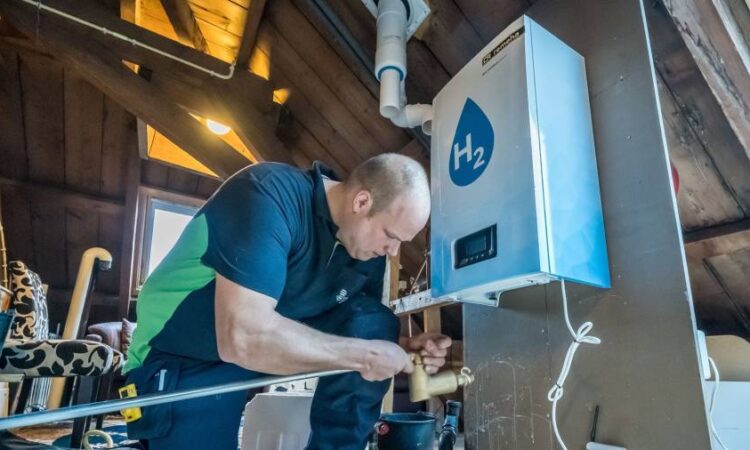
Ministers should give the go-ahead this year for the blending of hydrogen into the UK gas network so long as it is demonstrably safe, according to the government’s adviser on the low-carbon gas.
The recommendation is one of the main findings of a report published on Wednesday by Jane Toogood, who was appointed the UK’s “hydrogen champion” last July.
The government has previously indicated that it would decide by the end of the year whether to mix up to 20 per cent of hydrogen into the gas distribution systems as part of its 2050 net zero carbon target. Replacing natural gas-fired boilers is a crucial part of that goal, as homes account for about a fifth of greenhouse gas emissions.
Toogood, who is chief executive of Johnson Matthey’s Catalyst Technologies business, which supplies technologies used in hydrogen production, said the government should approve blending “the sooner the better” to help stimulate demand.
Low-carbon hydrogen is seen as a greener alternative to fossil fuels because it does not produce carbon dioxide when burnt in air, although some scientists have warned the process does produce polluting nitrogen oxide emissions.
The gas is known as green hydrogen when produced via the electrolysis of water using renewable power, or blue hydrogen when made from natural gas, with carbon dioxide as a byproduct, which is then captured and stored.
Toogood said both types of the hydrogen could be blended into the gas network, adding that she agreed with the government that at least half should be “electrolytic hydrogen”.
Opinion on whether low carbon hydrogen would be appropriate for use in domestic boilers has become polarised. Gas infrastructure companies argue a switch to hydrogen boilers would be less disruptive when compared with fitting other low carbon heating systems such as electric heat pumps.
Opponents have argued that blending hydrogen could prolong the use of natural gas for domestic heating and is less economic and less efficient than alternatives such as electric heat pumps or solar thermal.
Cornwall Insight, the energy analysts, have predicted that using hydrogen for home heating could be as much as 70 per cent more expensive than using natural gas.
Toogood also urged ministers to bring forward the point at which all new gas boilers should be “hydrogen ready”. She said that point should come as early as 2026 and was necessary because not all homes could easily convert to “electric heat pumps”.
“I’m recommending that we give clarity about that decision . . . assuming we get the safety case allowed,” she said. The Health and Safety Executive is assessing the safety of using hydrogen in domestic, commercial and industrial settings.
She said that up until 1967 the UK’s old gas network used “town gas”, which is derived from coal and contains a high proportion of hydrogen: about 50 per cent. “This is not new,” she said.
Toogood added that the government should “electrify where we can” but pointed out that Britain is dependent on gas, used by 83 per cent of homes and 200,000 businesses.
She conceded that low-carbon hydrogen was a “nascent” industry and did not offer a “silver bullet” for Britain’s future energy needs.
Her report also called on the government to ensure hydrogen production projects were delivered “at scale” to boost investor confidence.
Toogood said energy-intensive industries — such as cement, steel and glass — were particularly suitable for conversion to hydrogen. It could also be used to power commercial aircraft, ships and larger vehicles such as HGVs and ambulances, which cannot afford lengthy recharging times.
Additional reporting by Harry Dempsey






